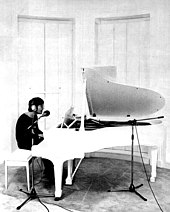1970–80: Solo career
1970–72: Initial solo success and activism
In 1970, Lennon and Ono went through primal therapy with Dr. Arthur Janov in Los Angeles, California. Designed to release emotional pain from early childhood, the therapy entailed two half-days a week with Janov for four months; he had wanted to treat the couple for longer, but they felt no need to continue and returned to London.[88] Lennon's emotional debut solo album, John Lennon/Plastic Ono Band (1970), was received with high praise. Critic Greil Marcus remarked, "John's singing in the last verse of 'God' may be the finest in all of rock."[89]The album featured the songs "Mother", in which Lennon confronted his feelings of childhood rejection,[90] and the Dylanesque "Working Class Hero", a bitter attack against the bourgeois social system which, due to the lyric "you're still fucking peasants", fell foul of broadcasters.[91][92] The same year, Tariq Ali's revolutionary political views, expressed when he interviewed Lennon, inspired the singer to write "Power to the People". Lennon also became involved with Ali during a protest against Oz magazine's prosecution for alleged obscenity. Lennon denounced the proceedings as "disgusting fascism", and he and Ono (as Elastic Oz Band) released the single "God Save Us/Do the Oz" and joined marches in support of the magazine.[93]
 |
Sample of "Imagine", Lennon's "most famous post-Beatles track."[94] Like "Give Peace a Chance", the song became an anti-war anthem, but its lyrics offended religious groups. Lennon's explanation was, "If you can imagine a world at peace, with no denominations of religion—not without religion, but without this 'my god is bigger than your god' thing—then it can be true."[95]
|
| Problems playing this file? See media help. | |
With Lennon's next album, Imagine (1971), critical response was more guarded. Rolling Stone reported that "it contains a substantial portion of good music" but warned of the possibility that "his posturings will soon seem not merely dull but irrelevant".[96] The album's title track would become an anthem for anti-war movements,[97] while another, "How Do You Sleep?", was a musical attack on McCartney in response to lyrics from Ram that Lennon felt, and McCartney later confirmed,[98] were directed at him and Ono. However, Lennon softened his stance in the mid-1970s and said he had written "How Do You Sleep?" about himself.[99] He said in 1980: "I used my resentment against Paul … to create a song … not a terrible vicious horrible vendetta […] I used my resentment and withdrawing from Paul and the Beatles, and the relationship with Paul, to write 'How Do You Sleep'. I don't really go 'round with those thoughts in my head all the time."[100]
Lennon and Ono moved to New York in August 1971, and in December released "Happy Xmas (War Is Over)".[101] The new year saw the Nixon administrationtake what it called a "strategic counter-measure" against Lennon's anti-war and anti-Nixon propaganda, embarking on what would be a four-year attempt to deport him. In 1972, Lennon and Ono attended a post-election wake held in the New York home of activist Jerry Rubin after McGovern lost to Nixon.[102][103] Embroiled in a continuing legal battle with the immigration authorities, Lennon was denied permanent residency in the US (which wouldn't be resolved until 1976).[104] Depressed, Lennon got intoxicated and had sex with a female guest, leaving Ono embarrassed. Her song "Death of Samantha" was inspired by the incident.[105]
Recorded as a collaboration with Ono and with backing from the New York band Elephant's Memory, Some Time in New York City was released in 1972. Containing songs about women's rights, race relations, Britain's role in Northern Ireland and Lennon's problems obtaining a green card,[106] the album was poorly received—unlistenable, according to one critic.[107] "Woman Is the Nigger of the World", released as a US single from the album the same year, was televised on 11 May, on The Dick Cavett Show. Many radio stations refused to broadcast the song because of the word "nigger".[108] Lennon and Ono gave two benefit concerts with Elephant's Memory and guests in New York in aid of patients at the Willowbrook State School mental facility.[109] Staged at Madison Square Garden on 30 August 1972, they were his last full-length concert appearances.[110]

No comments:
Post a Comment